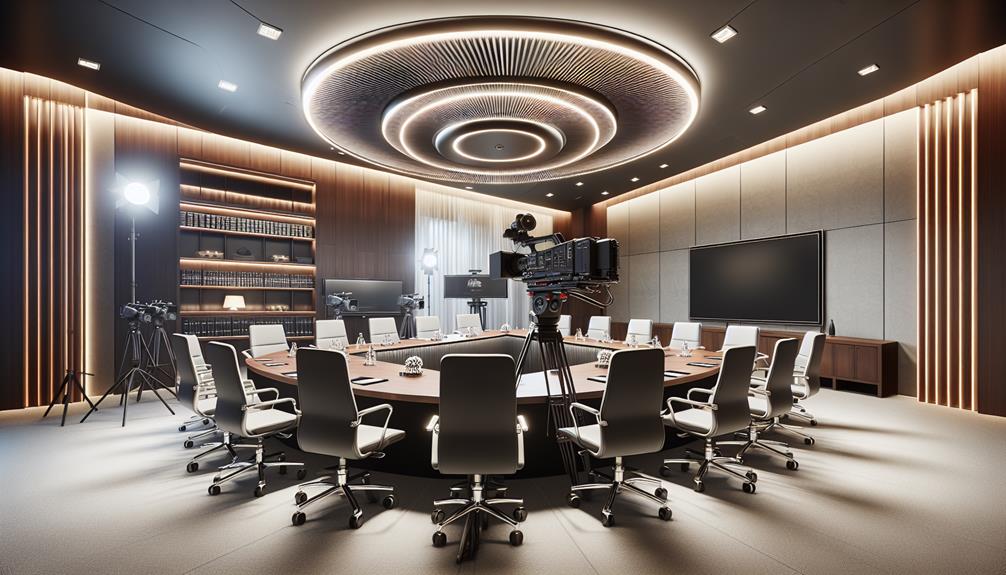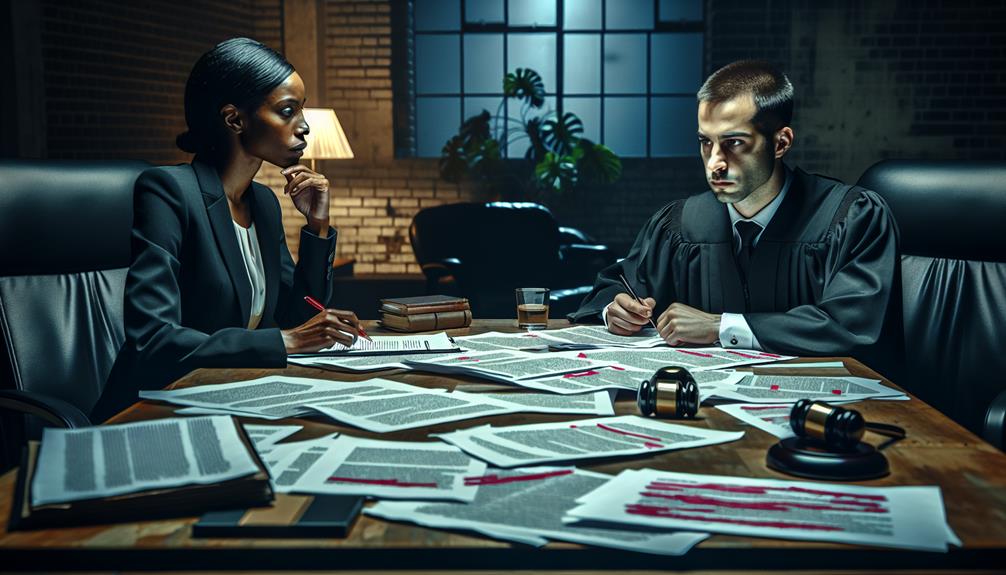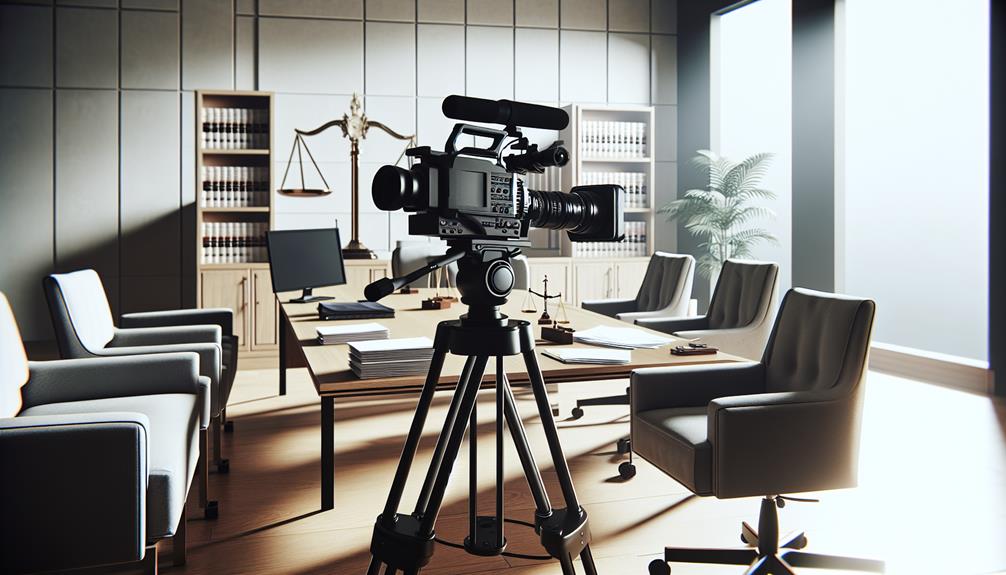Proper preparation for video depositions is absolutely crucial. Trust me, I've seen it all. From fumbling with technology to witnesses caught off guard, the consequences of inadequate preparation can be disastrous.
But fear not, for in this discussion, we will uncover the key reasons why proper preparation is vital for video depositions.
So buckle up and get ready to discover the secrets that will ensure your success in the world of video depositions.
Key Takeaways
- Selecting a suitable location and creating a productive environment is essential for a successful video deposition.
- Gathering and organizing essential documents beforehand ensures easy access and accurate information during the deposition.
- Thoroughly preparing the witness through review, mock depositions, and effective questioning techniques is crucial.
- Familiarizing yourself with the technology and being prepared for potential challenges will help you feel confident and in control during the deposition.
Setting the Stage

Setting the stage for video depositions can greatly enhance the effectiveness and efficiency of the proceedings. Creating the right atmosphere is crucial in order to ensure that all participants feel comfortable and focused. By carefully selecting the location and setting up the room, distractions can be minimized, allowing everyone involved to fully engage in the deposition process.
One key aspect of creating the right atmosphere is choosing a suitable location. A quiet and private space is essential to avoid interruptions and maintain confidentiality. Additionally, the room should be well-lit and equipped with proper audio and video technology to ensure clear communication and recording.
Managing distractions is another vital element in setting the stage for a successful video deposition. This can be achieved by establishing ground rules and guidelines for all participants to follow. For example, instructing everyone to turn off their cell phones and refrain from side conversations can help maintain focus and prevent interruptions.
Furthermore, providing comfortable seating arrangements and refreshments can contribute to a relaxed and productive environment. This helps alleviate any physical discomfort or distractions that may arise during the deposition.
Gathering Essential Documents
To ensure a smooth and efficient video deposition, it's crucial to gather all essential documents beforehand. Document organization and information accuracy are key factors in ensuring a successful deposition. By gathering and organizing all relevant documents, you can save time and avoid potential complications during the deposition process.
Document organization is essential for easy access and retrieval of information. By categorizing and labeling documents appropriately, you can quickly locate and present the necessary evidence during the deposition. This level of organization not only saves time but also enhances the overall efficiency of the deposition process.
Additionally, ensuring the accuracy of the information contained in the documents is of utmost importance. Any inaccuracies or inconsistencies can have a significant impact on the outcome of the case. Therefore, it's crucial to review all documents thoroughly, cross-referencing them with other sources if necessary, to ensure that the information presented is accurate and reliable.
Preparing Your Witness

I always ensure that my witness is thoroughly prepared for the video deposition, as their performance can greatly impact the outcome of the case. Witness credibility is of utmost importance, and proper preparation is key to establishing their credibility during the deposition. Effective questioning techniques are crucial in eliciting the most accurate and useful information from the witness.
To prepare the witness, I start by thoroughly reviewing their deposition testimony. This helps me identify any inconsistencies or gaps that need to be addressed. I then conduct a mock deposition, simulating the actual video deposition environment. This allows the witness to become familiar with the process, reducing any anxiety or nervousness they may have.
During the preparation sessions, I focus on teaching the witness effective questioning techniques. I emphasize the importance of listening carefully to each question and taking the time to formulate a thoughtful response. I also train them on how to maintain composure and professionalism, even when faced with challenging or confrontational questions.
Familiarizing Yourself With the Technology
Thorough preparation for a video deposition not only involves ensuring the witness is ready, but also requires familiarizing oneself with the technology involved to effectively navigate the deposition process. As an attorney, it's crucial to understand the ins and outs of the video technology being used, as it can greatly impact the success of your case.
First and foremost, it's important to acknowledge that there may be a learning curve when it comes to using video deposition technology. Familiarize yourself with the software or platform that will be used, and take the time to become proficient in its features and functionalities. This will help you feel more confident and in control during the actual deposition.
Additionally, it's essential to be equipped with troubleshooting techniques. Like any technology, issues may arise during a video deposition, such as poor audio quality or connectivity problems. Being prepared with troubleshooting strategies will allow you to address these issues swiftly and efficiently, minimizing disruptions to the deposition process.
Anticipating and Addressing Challenges

Addressing potential challenges is a crucial aspect of effective preparation for video depositions. It's essential to anticipate and overcome objections that may arise during the deposition process. By doing so, we can ensure a smooth and successful video deposition.
One challenge that may arise is objections from opposing counsel. To overcome this challenge, it's important to thoroughly research and understand the case, the relevant laws, and the rules of the deposition. By being well-prepared, we can confidently address any objections that may arise and effectively defend our position.
Another challenge is using effective questioning techniques. As the deposition is recorded on video, it's crucial to ask clear and concise questions to elicit the desired information. By using open-ended questions, we can encourage the witness to provide detailed responses, which can be especially valuable during video depositions.
Preparing for potential challenges in video depositions is essential for a successful outcome. By overcoming objections and using effective questioning techniques, we can ensure that the deposition is productive and serves its intended purpose.
It's through careful preparation and anticipation that we can navigate through any challenges that may arise and achieve the desired results.
Conclusion
Proper preparation is the key to success when it comes to video depositions. By setting the stage, gathering essential documents, preparing your witness, and familiarizing yourself with the technology, you can ensure a smooth and effective deposition.
Anticipating and addressing challenges ahead of time will also help you navigate any unexpected hurdles. With careful planning and attention to detail, you can confidently navigate the world of video depositions and achieve the best possible outcomes for your case.

